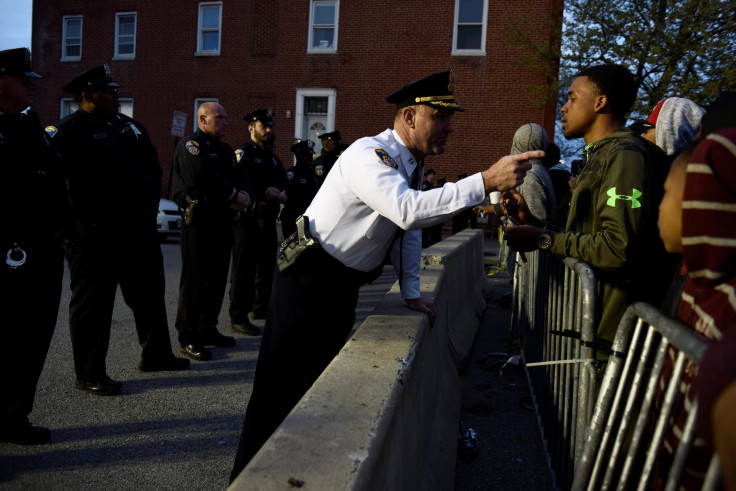Police Reform 2017: Baltimore Consent Decree Could Be DOJ's Last Until 2021

The city of Baltimore and the Justice Department reached an agreement on how to reform the city's police department on Thursday, just days before the administration of President-Elect Donald Trump takes power. It could very well be the last time such an agreement is reached until after Trump leaves office.
The agreement, called a consent decree, requires Baltimore and the Baltimore Police Department to implement comprehensive reforms, the Justice Department said. Some of these reforms include establishing a Community Oversight Task Force to recommend improvements to civilian oversight, adopting community-oriented policing strategies and de-escalation techniques, and ensuring the safe transport of detainees.
"We have no illusions that change is easy or that it comes about overnight," said U.S. Attorney General Loretta Lynch at press conference on Thursday to announce the agreement, the Baltimore sun reported. She added that achieving the conditions of the agreement will "require sustained efforts from all parties."
More than 20 cities were engaged in consent decrees with the Justice Department as of Thursday. The decrees allow cities to avoid Justice Department litigation for civil rights violations by following agreed upon reform steps. Independent monitors evaluate the city's progress. In this case, the monitor will have a three-year term, with pay capped at $1.47 million annually, the Baltimore Sun reported.
The Obama administration has embraced the use of consent decrees to help police reform efforts nationwide. Donald Trump's nominee for attorney general, Sen. Jeff Sessions (R-Alabama), criticized the use of consent decrees in confirmation hearings on Tuesday. As attorney general, Sessions will helm the Justice Department and would have say over whether to investigate local police departments or enter into consent decree negotiations.
"I think there is concern that good police officers and good departments can be sued by the Department of Justice when you just have individuals within a department that have done wrong," Sessions said. "These lawsuits undermine the respect for police officers and create an impression that the entire department is not doing their work consistent with fidelity to law and fairness, and we need to be careful before we do that."
In April 2015, protests — and riots that caused $9 million in damages — broke out in Baltimore after Freddie Gray, 25, died from neck injuries sustained sometime between his arrest and a subsequent ride in a police van. Six officers were charged in connection with Gray's death, although none were convicted. Acquittals in early trials led prosecutors to drop charges against the remaining officers. The Justice Department launched an investigation into the Baltimore Police Department in May 2015, and announced in August 2016 that the investigation revealed that the department had violated the civil rights of residents.
"We found that BPD has engaged in a pattern or practice of serious violations of the U.S. Constitution and federal law that has disproportionately harmed Baltimore’s African-American community and eroded the public’s trust in the police," said Principal Deputy Assistant Attorney General Vanita Gupta, head of the DOJ's' Civil Rights Division, in a statement at the time.
The Baltimore Fraternal Order of Police objected to not being included in the negotiation of the consent decree.
Statement from FOP regarding release of DOJ Consent Decree pic.twitter.com/osQKJYob82
— Baltimore City FOP (@FOP3) January 12, 2017
Congress gave the Justice Department the power to use consent decrees to reform local law enforcement agencies in a 1994 bill written in response to the Rodney King beating and allegations of racism against the Los Angeles Police Department. In 2008, Sessions, who was once attorney general of Alabama, criticized consent decrees in a policy paper.
“One of the most dangerous, and rarely discussed, exercises of raw power is the issuance of expansive court decrees,” he wrote. “Consent decrees have a profound effect on our legal system as they constitute an end run around the democratic process.”
On Friday, the Justice Department is expected to release a report detailing its investigation into the Chicago Police Department. If Sessions is confirmed as the nation's next attorney general, how he handles the results of the Chicago investigation could set the tone for how his DOJ will manage relationships with local police forces.
© Copyright IBTimes 2024. All rights reserved.












